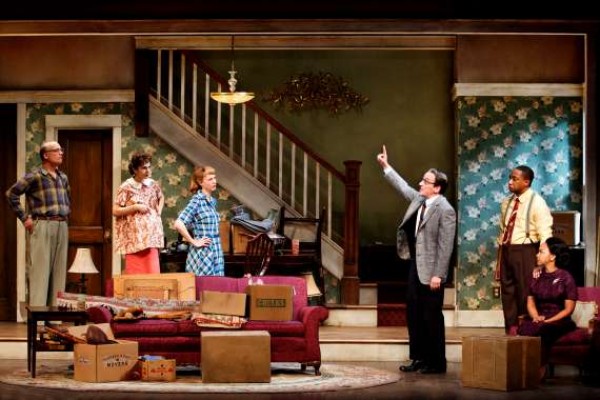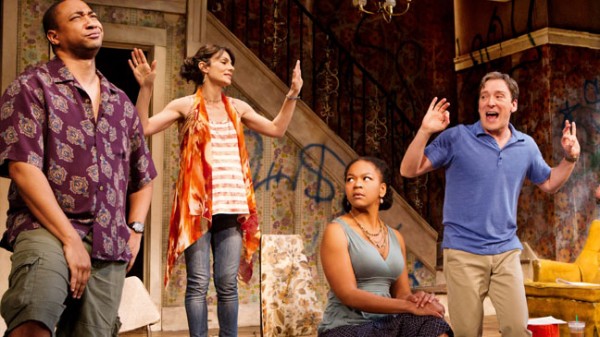Walter Kerr Theatre
219 West 48th St.
Extended through September 2, $30 – $220
clybournepark.com
The best plays stay with you long after you leave the theater, making you think and encouraging an ongoing dialogue. Bruce Norris’s Clybourne Park is one such play. As we exited the theater, my guest and I got into a heated discussion about several of the issues the complex story raises, for nothing about Clybourne Park is black and white, yet everything about Clybourne Park is black and white. Winner of the Tony and the Olivier for Best Play as well as the Pulitzer Prize, Clybourne Park is divided into two distinct halves that are cleverly linked in both obvious and subtle ways by writer Norris (The Infidel, Purple Heart) and director Pam MacKinnon (Completeness, The Four of Us). Inspired by A Raisin in the Sun by Lorraine Hansberry, the first black playwright to have her work produced on Broadway, Clybourne Park opens in 1959, as Russ (Frank Wood) and Bev Stoller (Christina Kirk) are preparing to leave their lily-white neighborhood shortly after a family tragedy. When Karl Lindner (Jeremy Shamos) finds out that their house is being sold to a black couple, he tries to convince Russ not to go through with the deal, worried about what will happen to property values and afraid of potential white flight. Meanwhile, Albert (Damon Gupton) comes to the house to pick up his wife, Francine (Crystal A. Dickinson), who works as the Stollers’ maid, and he is not afraid to throw in his own two cents. As things threaten to explode, Karl’s wife, Betsy (Annie Parisse), a deaf woman who is pregnant, can’t quite understand why everyone is getting so mad at one another, and Rev. Jim (Brendan Griffin) finds that church doctrine is not going to help solve this problem either.
The second act takes place fifty years later, in 2009, as a white couple, Steve (Shamos) and his pregnant wife, Lindsey (Parisse), have bought the very same house, now dilapidated, from a black couple, Lena (Dickinson) and Kevin (Gupton). As ditzy real estate agent Kathy (Kirk) shares some interesting tidbits about the changing nature of her business, the two couples are soon involved in a nasty battle that centers on the one word nobody wants to say: race. Clybourne Park is an extremely cleverly written play, tackling long-standing racial issues with intelligence, sensitivity, and humor. Having the actors play dual roles furthers direct comparison between the past and the present. Early in the second act, Steve is asked whether Lindsey is pregnant with a boy or a girl; while Steve knows the answer, Lindsey still wants to be surprised, so she puts her fingers in her ears and makes silly noises so as not to hear, echoing the deaf Betsy portrayed by Parisse in the first act. In the 1959 section, Russ is not ready to bring down a sentimental object from the attic; in 2009, hired hand Dan (Wood) is digging up the backyard, getting ready to potentially raze the house, much to the consternation of Lena, Kevin, and local resident Tom (Griffin), who is trying to address community rules. There are other fascinating, well-plotted similarities between the characters that the actors play in the first act with those they portray in the second act, giving the production a continuity that also shows how difficult it is for people to accept and adapt to change, no matter their race or religion. Clybourne Park is a smartly told story that clearly points out how far we truly are from a so-called post-racial society, a play that will stay with you for a very long time. (As an added bonus, the Lincoln Center Theater Review has dedicated its entire spring issue to the play, with pieces written by Paul Clemens, Beryl Satter, Bill Savage, and Patricia and Fredrick McKissack, an interview between Norris and John Guare, an interview with an anonymous real estate broker, and more; you can pick up a copy at the Walter Kerr Theatre for a dollar or download it for free here.)

